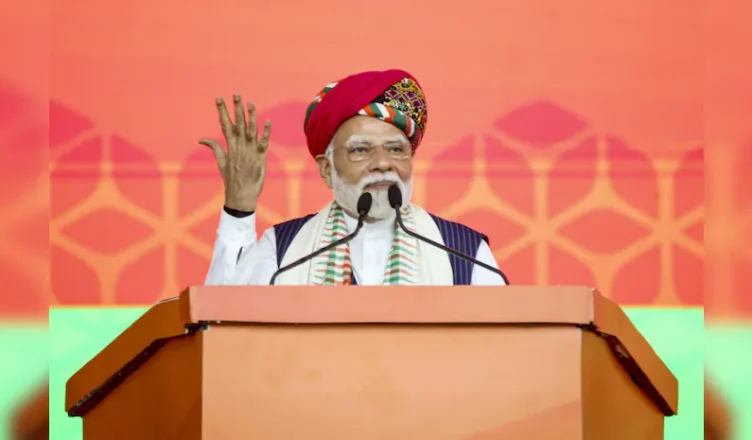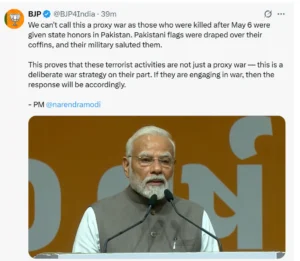
Prime Minister Narendra Modi’s recent warning to Pakistan has intensified the spotlight on India’s robust counter-terrorism measures, notably Operation Sindoor. This comprehensive military response underscores India’s unwavering commitment to national security and its proactive stance against cross-border terrorism.
PM Modi’s Stern Warning to Pakistan
During a rally in Bhuj, Gujarat, PM Modi addressed the people of Pakistan, urging them to choose peace over terrorism. He stated, “Live a life of peace and happiness and eat bread… otherwise, my bullets are always there.” He emphasized that continued support for terrorism would invite a strong Indian response, referencing Operation Sindoor’s success in targeting terrorist bases.
PM Modi further asserted that Pakistan’s actions are no longer viewed as mere “proxy wars” but as deliberate strategies to target India. This marks a significant shift in India’s perception of cross-border hostilities. (The Economic Times)
In retaliation to the April 22 Pahalgam terrorist attack, which claimed 26 lives, India launched Operation Sindoor on May 7, 2025. This swift and strategic operation targeted nine terror camps across Pakistan and Pakistan-occupied Kashmir, including locations in Muzaffarabad, Bahawalpur, and Sialkot. Over a span of 25 minutes, the Indian Armed Forces executed 24 precision missile strikes, resulting in the elimination of approximately 70 terrorists and injuring over 60 others. (Vajiram and Ravi, www.ndtv.com)
The operation was meticulously planned and executed, utilizing real-time intelligence and advanced weaponry to ensure minimal collateral damage. It marked a significant escalation in India’s counter-terrorism strategy, demonstrating a shift from reactive to proactive measures.(Vajiram and Ravi)
Following Operation Sindoor, Pakistan attempted retaliatory strikes using drones and missiles targeting Indian military installations across Northern and Western India. However, India’s Integrated Counter-UAS Grid and Air Defence systems effectively neutralized these threats, intercepting 413 Pakistani drones and several missiles. This robust defense mechanism safeguarded critical infrastructure and civilian areas, showcasing India’s advanced technological capabilities in aerial defense. (India Today, The Times of India)
The recent conflict has highlighted the increasing reliance on unmanned aerial vehicles (UAVs) in modern warfare. Both India and Pakistan have accelerated their drone procurement and development programs, signaling a new arms race in the region. India plans to invest up to $470 million in UAVs over the next two years, alongside a $4.6 billion emergency military procurement push. (Reuters)
In light of heightened security concerns, India temporarily suspended civil flight operations at 32 airports, primarily located near the India-Pakistan border. This precautionary measure aimed to ensure the safety of civilians and prevent potential disruptions during military operations. (The Indian Express)
PM Modi’s unequivocal stance and the execution of Operation Sindoor signify a pivotal moment in India’s national security policy. The shift from a reactive to a proactive approach in counter-terrorism reflects India’s resolve to deter future threats and maintain regional stability.
As tensions persist, the international community continues to monitor the situation closely, emphasizing the importance of diplomatic engagement and conflict resolution to prevent further escalation.


